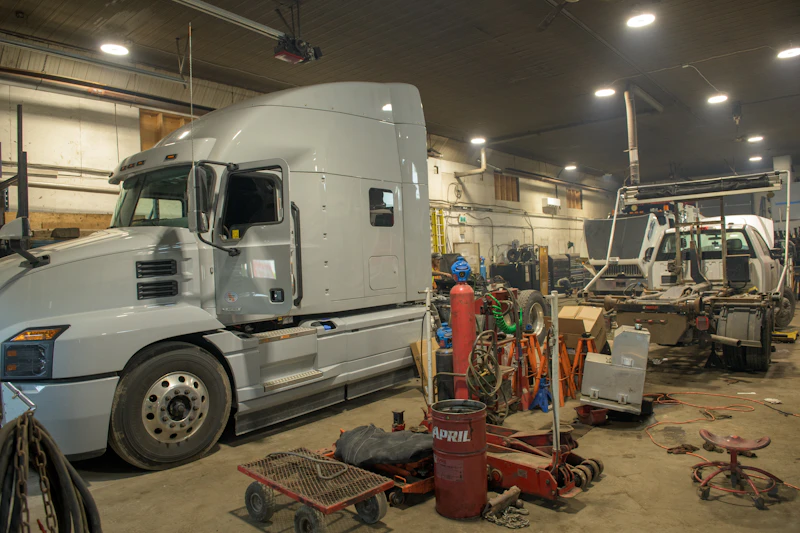7 Preventive Maintenance Tasks That Keep Your Truck Running Strong

7 Preventive Maintenance Tasks That Keep Your Truck Running Strong
When you’re running loads across Texas or tackling short hauls in city traffic, one thing’s for sure—breakdowns are brutal on your bottom line. They kill uptime, rack up tow bills, and often stem from problems that could’ve been caught early. That’s where preventive maintenance steps in.
People should understand that simple, consistent service is what separates trucks that stay on the road from those collecting dust in a yard. Here are the seven most essential preventive maintenance tasks every heavy-duty truck operator should have on their checklist.
1. Oil & Filter Changes
This is one of the most important steps of preventive maintenance. Engine oil doesn’t just lubricate—it also cools, cleans, and protects your engine from wear. Over time, oil breaks down and becomes contaminated with soot, carbon, and fuel residues. And if you don’t change the oil filter after an oil change, the new oil will get contaminated instantly.
Skipping oil changes leads to accelerated wear, poor fuel economy, and eventually catastrophic engine failure. Depending on the duty cycle and engine type, most trucks need an oil change every 15,000 to 25,000 miles.
2. Fuel and Air Filter Replacements
Fuel filters protect your injectors and high-pressure fuel system from contamination. Even a tiny piece of debris can cause injector wear or a no-start condition. Depending on your engine, you may have both primary and secondary filters that need routine service.
Similarly, a dirty air filter restricts airflow to the engine, which decreases combustion efficiency and raises exhaust temperatures. Replacing both filters at scheduled intervals not only improves engine performance but also protects expensive components like the turbocharger and EGR valve.
3. Brake System Inspections
Every trucker knows brakes are a big deal—but few perform regular inspections until there’s a problem. Preventive brake maintenance should include:
- Checking slack adjuster trave
- Inspecting brake shoes for wea
- Listening for air leaks in chambers or lines
- Measuring pushrod stroke
- Verifying drum integrity
Overheated brakes, leaking chambers, or worn linings don’t just hurt stopping power—they can shut you down at a roadside inspection. Stick to regular brake checks to avoid costly fines, prevent damage to related components, and, more importantly, keep you safe.
4. Coolant System Service
Your coolant system is responsible for keeping engine temperatures in check under heavy loads and extreme heat. Over time, coolant breaks down and loses its anti-corrosive properties, leading to sludge, scale buildup, or even internal damage. Make sure to:
- Flush and refill coolant per manufacturer specs
- Check for cracked or leaking hoses
- Test pressure in the radiator cap
- Verify fan clutch and thermostat function
Ignoring cooling system maintenance is a recipe for overheating, which can warp cylinder heads, destroy gaskets, and leave you stranded on the side of the highway.
5. Transmission and Differential Fluid Checks
Just like your engine, your transmission and differentials need clean fluid to function. Transmission fluid cools, cleans, and lubricates high-pressure gear systems. Gear oil in differentials cushions extreme torque loads and prevents metal-on-metal wear. Both degrade over time due to heat and contamination. Make fluid checks a routine part of your PM, and don’t wait for shifting problems or vibration to appear before acting.
6. Tire and Wheel Inspections
Your tires do more than carry your load—they affect fuel economy, safety, and alignment. Preventive tire maintenance includes:
- Checking tread depth and wear patterns
- Maintaining optimal PSI per axle and load
- Inspecting for cracks, bulges, and punctures
- Rotating tires every 10,000 to 15,000 miles
- Verifying wheel torque and alignment
Catching tire problems early helps prevent blowouts and saves money in fuel and suspension wear. It’s also one of the first things DOT inspectors will look at during a roadside check.
7. Electrical and Battery System Checks
Modern diesel trucks rely heavily on electronics—from ECMs to emissions systems and sensors. Weak batteries, loose terminals, or corroded connections can throw off your entire system. During PM service, be sure to:
- Load test all batteries
- Inspect for swollen casings or corrosion
- Tighten and clean terminals
- Check alternator output
- Inspect wiring for wear or shorts
A solid electrical system means fewer starting issues, better sensor function, and more uptime.
Build a Routine and Stick to It
Preventive maintenance isn’t a one-time fix—it’s a discipline. These seven tasks form the foundation of a reliable service plan that keeps your rig profitable, compliant, and road-ready. At Saviors Repair, we help truckers in Pearland, TX keep their trucks running like new, mile after mile.
Don’t wait for a warning light or breakdown to force your hand. Take action now—your truck, your wallet, and your schedule will thank you. For more information on truck maintenance, read our article about common brake maintenance mistakes.


.webp)
.webp)